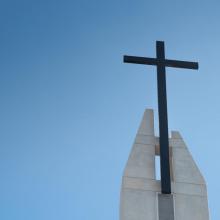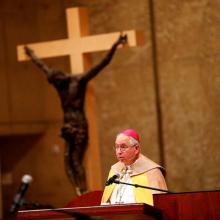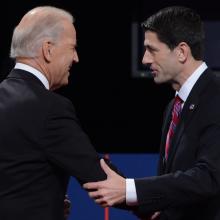catholic vote
THE ELECTION DID NOT, as many had hoped, offer a resounding renunciation of Trumpism and its often-explicit white supremacist ideology. On the contrary, millions more people than four years ago voted for a man (and a worldview) with few illusions about his nature, showing a willingness to ignore, if not condone, racism, misogyny, and xenophobia.
Trump’s presidency made unarguably clear, for those who harbored doubts, that racism and white supremacy are not restricted to a small, inconsequential fragment of society tucked away in the shadows. Now, it’s distressingly but importantly clear that a very significant minority of voters either harbors these views explicitly or is fine with ignoring or downplaying them for their own perceived advantage. As painful as that is to acknowledge, it’s actually a step in the right direction, since a problem cannot be addressed until it is first named.
A primary task before us as we emerge from the destructive tumult of the past four years is to mitigate the damage done to so many people and to our earth itself. “Mitigation,” by definition, includes “reducing the harmful effects” of actions taken. It’s considered a stage of emergency management, which feels about right.
On Friday, President Donald Trump prepared to be the first U.S. president to attend the March for Life, the annual gathering of anti-abortion activists and faith groups in Washington, D.C., just after Vice President Mike Pence met with Pope Francis during an unusually long audience at the Vatican.
If President Obama’s appearance at the Notre Dame commencement in 2009 sparked an unprecedented uproar among American Catholics, imagine what inviting President Trump to graduation might provoke.
That concern is making Notre Dame’s president, the Rev. John Jenkins, think twice about making a pitch for the incoming U.S. president to receive an honorary degree, an appearance that almost any school would normally covet — and one that the iconic Catholic university has been more successful than others in securing.

Image via Thanate Rooprasert/Shutterstock.com
First came the mayors of New York, Chicago, and Seattle declaring their cities “sanctuaries”, and saying they will protect undocumented immigrants from President-elect Donald Trump’s plan to deport them.
Then thousands of students, professors, alumni, and others at elite universities, including Harvard, Yale, and Brown, signed petitions, asking their schools to protect undocumented students from any executive order.
Now, religious congregations, including churches and synagogues, are declaring themselves “sanctuaries” for immigrants fleeing deportation.
A week after Donald Trump’s stunning election as president sent the country’s governance lurching to the right, the nation’s Catholic bishops sent a message of their own — at least on immigration — by putting Mexican-born Archbishop Jose Gomez of Los Angeles in line to become the first Latino to lead the American hierarchy.
But the vote at their annual fall meeting in Baltimore on Nov. 15 also suggested that the U.S. Conference of Catholic Bishops is still hesitant to fully endorse the more progressive and pastoral approach to ministry that Pope Francis has been championing since his election in 2013.
Donald Trump’s victory in the 2016 presidential election has few parallels in the history of contemporary politics in the Western world.
But the closest one is familiar to me: Silvio Berlusconi, the media tycoon who was elected prime minister of Italy — my homeland — for the first time on March 27, 1994 and who served four stints as prime minister until 2011.
BALTIMORE — After sweeping setbacks to the hierarchy’s agenda on Election Day, New York Cardinal Timothy Dolan on Monday told U.S. Catholic bishops that they must now examine their own failings, confess their sins and reform themselves if they hope to impact the wider culture.
“That’s the way we become channels of a truly effective transformation of the world, through our own witness of a repentant heart,” Dolan, president of the U.S. Conference of Catholic Bishops, told the 250 bishops gathered here for their annual meeting.
“The premier answer to the question ‘What’s wrong with the world?’ is not politics, the economy, secularism, sectarianism, globalization, or global warming … none of these, as significant as they are,” Dolan said, citing many of the issues that have become favorite targets of the hierarchy.
More American Catholics believe their religious leaders should be focused on issues related to poverty and social justice during this election season, rather than spending time and energy on other issues such as abortion, according to a new survey released this week by the Public Religion Research Institute.
The results of the 2012 American Values Survey demonstrate that American Catcholics -- and the "Catholic vote" -- is far from the monolith some politicians might like to believe they are.
"The survey confirms that there is no such thing as the 'Catholic vote,'" Robert P. Jones, CEO of PPRI and co-author of the report, told Reuters. "There are a number of critical divisions among Catholics, including an important divide between 'social justice' and "right to life' Catholics."
For instance, on the question of the public engagement of the church, the 2012 American Values Survey found important divisions between Catholics who prefer a “social justice” emphasis that focuses on helping the poor and Catholics who prefer a “right to life” emphasis that focuses on issues such as abortion.
Catholicism’s social justice teachings have often been called the church’s “best-kept secret,” and after the Oct. 11 vice-presidential debate between Joe Biden and Paul Ryan – the first such showdown between the first two Catholics to oppose each other on a national ticket – that may still be the case.
While moderator Martha Raddatz earned kudos for her performance, her only question about the candidates’ shared Catholic faith came near the end of the 90-minute debate, and she framed it solely as a question of how their faith affects their policies on abortion rights.
That was seen as a victory for Catholic conservatives and Republicans who want to reinforce the image of the church as a “single-issue” religion – that issue being abortion – and a setback for liberal Democrats and others who have struggled to highlight the church’s teachings on the common good as central to Catholicism’s witness in the public square.
“What a lost opportunity!” wrote Michael O’Loughlin at the blog of America magazine, a national Jesuit weekly. “If the moderator planned to discuss faith, and I’m glad she did, why limit the discussion to one issue, however important, when the full spectrum of Catholic social teaching is ripe for an expansive and thought provoking conversation?”







